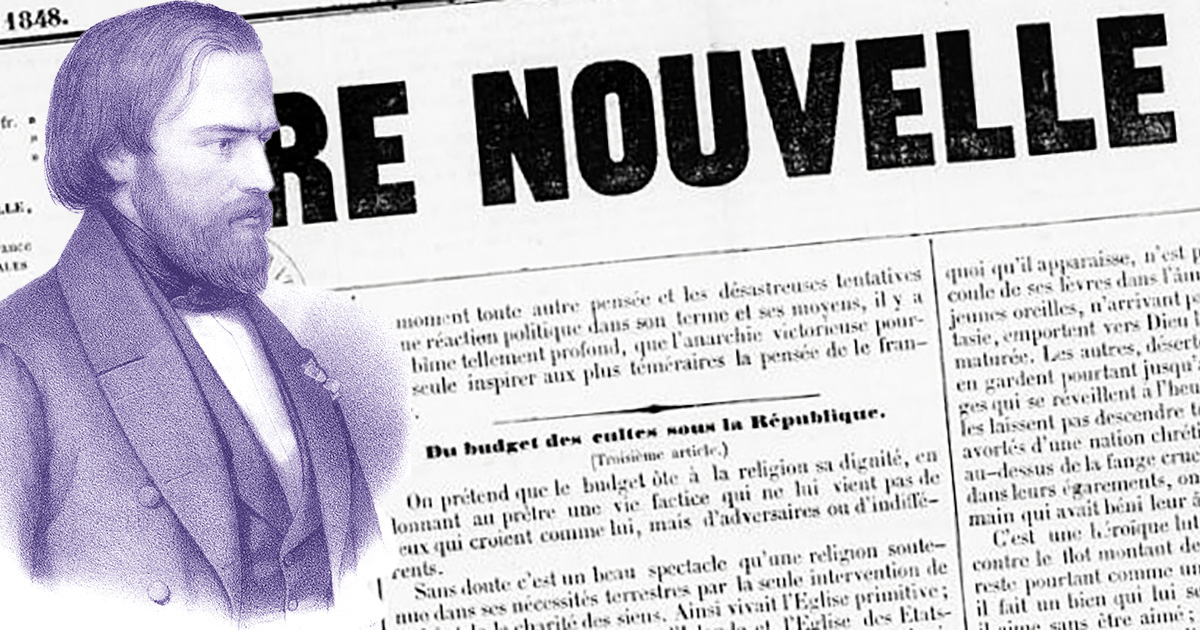Blessed Antoine-Frederic Ozanam (1813-1853), known worldwide as the principal founder of the Society of St. Vincent de Paul (SSVP), also had an outstanding career as a journalist, writer and author.
His contributions to the field of journalism were deeply influenced by his virtues of faith, charity and social justice, reflecting his commitment to social transformation and the defense of the poor.
Besides practicing charity towards those most in need, he was a very courageous man in exercising his Christian apostolate through the press and literature. With a degree in law and a passion for literature, Ozanam used his talent as a writer to defend and propagate Vincentian and Christian values. Ozanam had been writing articles for newspapers and bulletins since he was a teenager in Lyon, including the magazine “The Bee” and the newspaper “The Precursor.”
He made a name for himself when he arrived in Paris in 1831, at the age of 18, publishing articles and essays in periodicals in the French capital, looking for a way to respond to the social challenges of the time. Ozanam believed that the written word was a powerful tool for influencing minds and hearts, using journalism as a means of educating and raising awareness about the evils and injustices that everyone was witnessing.
During his journalistic career, Ozanam collaborated with various religious outlets, including the “Catholic Tribune”, where he wrote about the relationship between Christianity and contemporary social problems, always highlighting the importance of social justice and charity. His unwavering and reflective style began to gain prominence. This periodical was owned by his colleague Emmanuel-Joseph Bailly de Surcy (1st President General). Let’s not forget that the SSVP was born in this very place: at the headquarters of the “Catholic Tribune.”
Frederic used his gifts as a writer, literary scholar and journalist to warn against emerging political ideologies and heresies that challenged the Catholic Church of the time. Ozanam believed that Christianity was the key to resolving social injustices in a peaceful, serene and just manner. His publications were imbued with the conviction that faith and social action should go hand in hand.
He also wrote, at different times, for the following Parisian outlets: “The Correspondent”, “The Universe”, “The Religious Monitor” and “The European Magazine.” His publications were marked by an uncompromising defense of the rights of the poor and workers, connecting his faith to social issues. Inspired by the teachings of St. Vincent de Paul, he saw journalism as an extension of his Christian mission of service to those most in need.
Ozanam collaborated with several newspapers and magazines of his time, including the newspaper “The New Era”, founded by him and Fathers Lacordaire and Maret in 1848, where he published, for example, the famous articles “The Origins of Socialism” and “On Divorce”. This newspaper was created with the aim of denouncing the precarious conditions of Parisian workers and promoting social reforms inspired by Christian values. The newspaper “The New Era” occupied an important part of the history of the French Catholic press during the 19th century, promoting dialogue between civil society and the Church, the defense of democracy and the need for labor reform to promote labor rights.
Ozanam believed that true freedom of the press consisted in the responsibility to inform with honesty and moral rectitude. For him, freedom of expression should always be at the service of democracy, truth and justice, and never be used to manipulate or oppress. Through his articles, he addressed the urgent issues of the time, denouncing social injustices and the inhuman conditions in which workers lived.
In addition to his work as a journalist, Ozanam wrote several essays and books, in which he deepened his reflections on the relationship between faith and society. One of his recurring themes was the idea that Christianity had a fundamental role to play in the social and moral regeneration of Europe. His commitment to truth and justice not only made him an influential journalist, but also a moral reference in his time.
Ozanam’s virtues, such as humility, courage and compassion, were evident in his every word, both in his writings and in his articles and theses. He saw journalism as a platform for exercising intellectual charity, sharing knowledge and critical awareness with the public. His deep faith and love for the poor led him to be a fervent advocate for the social cause, using his skill with words to promote a more just and fraternal world.
Through his work as a journalist, Antoine Frederic Ozanam has not only left us a spiritual and intellectual legacy, but also a clear demonstration of how the press can be a positive and transforming force in society (something that, unfortunately, we are not so aware of today). At present, the media suffers from a number of problems, such as politicization disguised as economic interests that confuse people, leading them to behave in a manner contrary to Gospel values, showing indifference towards the most needy and excluded.
Ozanam was, without a doubt, a holy man who dignified the media of his time. In the pamphlets, articles, theses and books he wrote, Ozanam helped build the foundations of the Social Doctrine of the Church, and is considered a precursor of this Doctrine and a great example as a journalist and writer.
May the example of Ozanam continue to inspire Vincentians and all those who, like him, believe that the media and journalists themselves can be a powerful tool for social change. And may we find among today’s media professionals those who are concerned with reporting news related to charity, Gospel values, Vincentian virtues, ethics and social justice, as Ozanam did in his time!
Brother Renato Lima de Oliveira,
Journalist and writer, SSVP Commissioner to the United Nations and President General from 2016 to 2023.






Thanks for the write-up! I enjoyed reading it. Greetings from Botswana to you, and my Vincentian brothers and sisters.